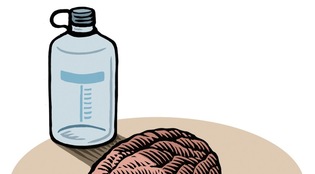 loading
loading
FindingsThe case against hard plasticsHow BPA affects the brain.  Gregory NemecView full imageThere's no escaping bisphenol A, an increasingly controversial chemical used since the 1950s to make hard plastics. BPA is found in many products, and because it often leaches out, especially when subjected to heat, traces of the substance can be detected in the urine of almost every U.S. citizen. A new Yale study, combined with several others, adds fuel to a growing anti-BPA fire. Neurobiologist Csaba Leranth, a professor at the medical school, and his colleagues have found that when monkeys were exposed to BPA at levels approximating those the Environmental Protection Agency has mandated as safe for humans, parts of their brains associated with memory and learning did not function normally. (The research appeared September 16 in the Proceedings of the National Academy of Sciences.) Studies in rodents have implicated BPA, an estrogen-like substance, in reproductive and developmental problems. But this is the first time the chemical has been shown to affect the primate brain. Leranth's team investigated whether, in female green monkeys, BPA could affect the number of spine synapses (which transmit messages) in the brain's hippocampus and prefrontal cortex. Leranth notes that "in females, one of the key controllers of spine synapse density is the hormone estrogen." He suspects BPA may block estrogen from playing its normal role in the brain. The researchers removed the ovaries of 12 young green monkeys. Three received estrogen supplements; three were given BPA at the upper limit of the EPA guidelines; three received estrogen plus BPA; and three received neither. The team found that BPA "wiped out" estrogen's effects on spine growth. "There was as much as a 60 percent decline in the number of spine synapses," says Leranth. In males, androgens are the controlling hormone, and Leranth has found a similar BPA-induced decline. Rodents with fewer spine synapses show memory and learning impairments. Leranth plans to see whether monkeys experience the same effects. The American Chemical Council, an industry trade group, has long maintained that BPA is safe, and federal regulatory agencies have generally concurred. But a recent study in the Journal of the American Medical Association found a correlation between higher BPA levels and increases in heart disease, diabetes, and liver abnormalities. A review by the U.S. National Toxicology Program found reason for "some concern" that BPA exposure in fetuses, infants, and children could cause adverse developmental effects (on the brain, on behavior, on the prostate gland). In October, Canada banned the substance from baby products. Leranth warns that "the biggest impact of BPA is likely to be on female children and post-menopausal women," because neither group produces enough estrogen to blunt the chemical's effect. Leranth has granddaughters, and he has asked his daughter to rid her house of as much BPA as possible. "It's not stuff you want in your body," he says.
The comment period has expired.
|
|